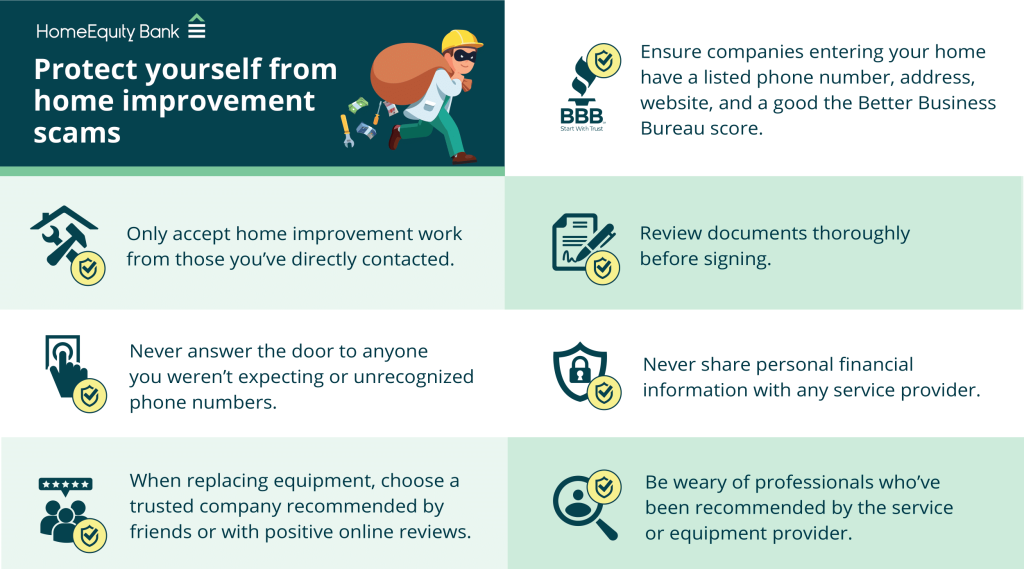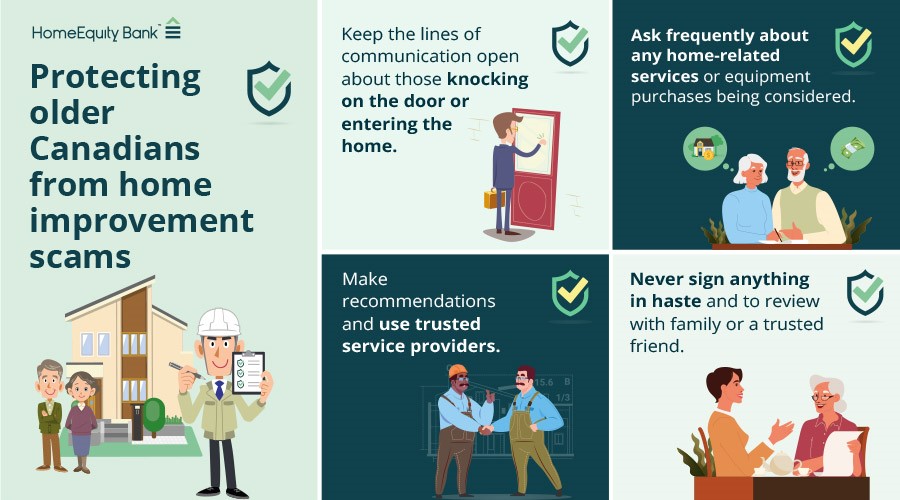HVAC (heating, ventilation and air conditioning) and home improvement scams are becoming increasingly common in Canada, along with a fairly new and troubling tactic that can cheat homeowners out of hundreds of thousands of dollars.
While these are not exclusively scams targeted at older Canadian homeowners (home improvement scams can target anyone), retired homeowners are being targeted more often than other age groups. Home renovation scam artists often target older homeowners, taking advantage of any cognitive issues they might have, as it’s easier to coerce them into signing documents.
Unlike computer or digital scams, which draw in their victims online, home improvement scams against the aging population usually happen in person, often over numerous visits. HVAC scams in Ontario alone have cheated people collectively out of millions of dollars.
In this article, we’ll reveal the most common HVAC and home improvement scams targeting retired Canadians, how the scams work and how the consequences can result in victims losing their homes. Plus, we’ll provide ways for Canadian homeowners age 55+ to protect themselves and their home.
What is an HVAC scam?
HVAC scams are an umbrella term to describe a range of fraudulent activities involving selling home services that the homeowner doesn’t actually need (they’re also known as home improvement or home renovation scams). They’re often carried out by people coming door-to-door, but can also be carried out by companies you’ve contacted, for example, to service your furnace.
How does an HVAC scam work?
Typically, a tradesperson/salesperson will inspect the equipment in your home and tell you it needs to be replaced urgently. Often, the urgency is due to legal reasons, or the equipment being dangerous, or that insurance won’t cover any damages caused by it. This unwarranted urgency and scare tactic can result in homeowner panic and the signing of documents without properly reviewing them.
These scam artists will portray themselves as saviours by saying they can solve your equipment problem by paying them a supposedly affordable monthly rate. What they actually do is get the homeowner to sign a contract to pay for the equipment monthly, over a long-term period such as 10 years at a price several times higher than the true value of the equipment.
One investigation by CBC’s Market Place into HVAC scams in Ontario caught a scammer on camera telling the homeowner that their hot water tank had to be replaced when, in fact, there was absolutely nothing wrong with it.
Escalating from home Improvement scams to property liens
Sadly, this side of HVAC scams is often just the beginning. Home improvement scams against the older population can often lead to even more costly scams. These scammers will often put a lien on the victim’s property after installing equipment, usually without their knowledge. They often trick the homeowner into signing documents that give them the right to put the lien on their property.
The lien can then only be taken off after the homeowner pays the full price for the equipment, which can often be several times its true value. This can be a real problem, as homes can only be sold once a lien is taken off them.
Preventing scams targeting retired Canadians
Preventing scams aimed at retirees is an ongoing concern for many police forces, provincial and federal government offices and legal organizations. While computer scams targeting retirees are also prevalent, and equally upsetting and stressful, they rarely involve the same potentially huge sums of money as HVAC scams, because signatures are needed to carry these out.
Various police and government bodies have issued steps on how to protect yourself from scams, including raising awareness of the tactics HVAC scammers use and how to recognize red flags.
How to spot the scare tactics of HVAC scammers
One of the first tell-tale signs of an HVAC scammer is when a representative of a home improvement company approaches you and offers a “free inspection” of some of your home equipment (typically a water heater, furnace, air conditioning unit or water purifier). That person will then tell you that the equipment needs to be replaced urgently.
They usually pressure you into installing equipment immediately, often with threats that the current equipment is dangerous or not compliant with your home insurance.
Some scammers approach homeowners with the offer of a “green home grant”, which seems to be part of a government program, but they then force the owner to use the “grant money” to buy equipment from them.
A tell-tale sign that the work has been carried out by scammers is if the equipment or renovation work is of poor quality or not even finished.
After selling you equipment (and often several pieces of equipment) the original company or a completely new one may then offer to help you consolidate your home equipment debt into one loan.
They may also introduce you to a lawyer to work on the deal on your behalf, to make the scam appear legitimate. In reality, they are all in on the scam together.
How to protect yourself from scams

First of all, don’t accept home improvement work from anyone whom you haven’t directly contacted yourself. To help avoid being lured into an HVAC scam, never answer the door to anyone you weren’t expecting, and don’t answer the phone if it’s a number that you don’t recognize.
If you do need equipment to be replaced, contact a company that you can trust: either one that has been recommended by friends who have used their services, or one that you have researched thoroughly online, and has several positive reviews.
Also, make sure that any company that comes into your home has a listed phone number, address and website, and that is has a good score with the Better Business Bureau.
Whenever a company asks you to sign something, tell them you need a few days to go over the documents first. If possible, ask a trusted friend or family member to go over them with you. Never share any personal financial information with any service provider.
Be wary of using a lawyer or other professional who has been recommended by the company providing the service or equipment. The only way to ensure that you get truly independent professional advice that is in your best interest is if you find and hire the professional yourself (preferably as a result of a recommendation from friends or family).
Steps to protect elderly parents from scams

Finally, if you have older parents:
1) Ask them frequently about any home equipment purchases being considered.
2) Make recommendations for service providers where possible.
3) Remind them not to sign anything in haste and to review documents with family or a trusted friend.
4) Keep the lines of communication open about people knocking on their door or entering their home.
If you adopt all of these tactics, you’ll be well placed to protect yourself and your family from scam artists.
HVAC case studies of retired homeowners scammed
Home improvement scams targeting older homeowners are more prevalent because retirees tend to be at home more often and are more likely to open the door to scammers, and scam artists tend to target the most vulnerable homeowners.
CBC’s marketplace has carried out several investigations into retirees who were scammed by HVAC scammers, and some of the stories are heartbreaking. While computer scams often receive a lot of publicity, less is broadcast about HVAC scams, which can result in victims losing tens of thousands of dollars, or even their home.
In one investigation, the CBC revealed that Karl Hoffmann received a foreclosure letter telling him he had to leave the home he’d lived in for 40 years. Karl is very vulnerable to scams, having had an aneurism 40 years earlier, which makes it difficult for him to make decisions. The scammers had sold him equipment that he didn’t need, didn’t ask for and didn’t know how to use, at a cost of over $100,000.
Danila Lim, an 88-year-old woman who is legally blind discovered that she owed scammers $500,000, while Marlene Hamilton’s story was also covered. The 69-year-old widow, who can’t read or write, ended up owing scammers $150,000 and lost her home.
Cecil Forde of London Ontario was scammed into having smart-home smoke detectors, doorbell cameras and thermostats fitted in both of his properties and only found out that the company had put a lien on them when he came to sell one of his homes. He had to pay the company $11,700 to remove the lien before he could sell it.
These stories really underline how important it is to know how to spot and protect yourself and older family members from scams.
How to report HVAC scams
While several provinces have banned door-to-door sales of HVAC equipment, HVAC scams continue to grow. If you or your family members have been targeted by scammers, you should contact your local police department and/or the Canadian Anti-Fraud Centre at 1-888-495-8501 or through its fraud reporting system.
Sadly, many home renovation scam victims have to go through the legal system to get justice from their scammers.
Services that can help victims of an HVAC scam
- The Law Society Referral Service provides free legal advice for up to 30 minutes.
- Pro Bono Ontario has a free legal advice hotline.
- JusticeNet provides legal expertise for people who don’t qualify for legal aid but who also can’t afford regular legal fees.
- Most provincial governments have a consumer protection department (such as Consumer Protection Ontario) that can help if you become a victim of HVAC scams. Search for consumer protection + your province.
- The Canadian Anti-Fraud Centre should be contacted for any computer scams on retirees.































